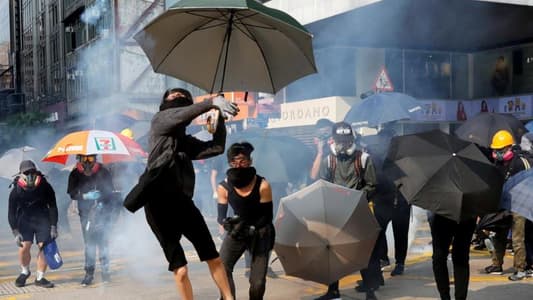Thousands of Hong Kong protesters, many wearing masks in defiance of emergency laws, staged an illegal march through the Kowloon district on Sunday that will test the strength of the pro-democracy campaign after four months of unrest.
Banners reading “Free Hong Kong” stretched across the ground, other posters read “HongKongers Resist”, and graffiti on one wall said “Better Dead than Red”.
Police have declared the march illegal, meaning the protesters face arrest. They ranged from young students to the elderly, many carrying umbrellas for protection from the sun and to shield their faces from street surveillance cameras.
The Kowloon area has been the site of some of the worst violence in recent weeks and tight security has been imposed along the march route, with metro stations closed and police placing water canons on the street.
Hardcore black-clad protesters, who have staged running battles with police and torched metro stations, were out on Sunday, setting up road blocks and spraying graffiti saying: “We chose to die on our feet rather than live on our knees!”.
A group of the “ninja” protesters trashed two shops and protesters damaged two metro stations.
The hardcore protesters have targeted Chinese banks and shops with links to mainland China, leaving mainland Chinese living in Hong Kong worried about their safety.
Protesters are angry at Hong Kong’s leader Carrie Lam for what they see as her failure to protect their freedoms from an encroaching Beijing, imposing colonial-era emergency powers, and allowing what they say is excessive force by police.
“Carrie Lam is not listening to us at all. This may work in China but not in Hong Kong,” said Cheung, a 33-year-old woman wearing a face mask and black Tshirt, symbols of the democracy movement. Like most protesters, she wanted to be known by only one name.
“You can’t ask a city that already has freedom to walk backward. You can’t do this in an international city,” she said, adding she was not afraid of being arrested.
Hong Kong has been battered by months of often massive and violent protests, the worst political crisis since Britain handed the city back to China in 1997.
The crisis in the Chinese-ruled city also poses the biggest popular challenge to China’s President Xi Jinping since he took power. Xi has vowed to crush any attempt to split China.
The unrest was sparked by a bill that would have allowed extradition to mainland China for trial in Communist Party-controlled courts. It has since widened into a pro-democracy movement.
Hong Kong has been relatively calm in the past two weeks after violent protests fueled by the introduction of emergency laws, which ban face masks at public rallies.
“We hope the world will stand with Hong Kong,” said Jack, a 20-year-old student wearing a paper Guy Fawkes mask.
“China can use its influence to erode human rights and values around the world. The protests are not just for Hong Kong. They’re for human rights and values globally.”
FEAR OF ARREST
Protesters have 5 core demands: universal suffrage, an independent inquiry into police action against protesters, amnesty for those charged, and an end to describing protesters as rioters, and the formal withdrawal of the extradition bill.
Lam has said the bill is dead, but it is yet to be formally withdrawn. She has rejected the other demands. On Sunday she said a police complaints inquiry will be completed before the end of the year.
Protesters say police have used excessive force, firing tear gas, rubber bullets, and sometimes live rounds, at protesters throwing petrol bombs and bricks.
Two people have been shot and wounded by police and thousands injured. Police have arrested more than 2,300 people since June.
Protesters believe the police refusal to issue a permit for Sunday’s march was an attempt to limit their numbers as some residents would be fearful of arrest for participating.
“The government pretends we just want to destroy the city. We’ll be out for as long as it takes to let the world know it is them who are destroying it,” said Ray, 24, who plans to go home after a few hours as he fears arrest.
The Asian financial hub is facing its first recession in a decade because of the unrest, with retail and tourism badly hurt. On Sunday shops, both luxury and small, were closed along the march route.
The city’s metro network, which carries some 5 million people daily, has been torched and trashed, and at one stage was forced to completely shut down.
Subway operator MTR Corp Ltd said several Kowloon stations were closed on Sunday, the airport express would not stop at Kowloon, and the network will again shut early.
The destination of the march is the West Kowloon station, the main railway interchange with mainland China, where authorities have heightened security and restricted access.
Protesters have erected road barricades and torn up pavement bricks and strewn them across the road outside the station.
Hong Kong is governed under a “one country, two systems” formula, which permits the city freedoms not available on the mainland such as an independent judiciary.
Beijing has rejected claims it is encroaching on these freedoms and blames Western nations, such as the United States and Britain, for inciting the unrest.






TWEET YOUR COMMENT